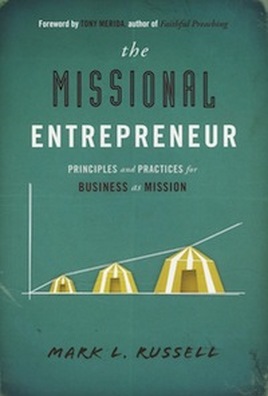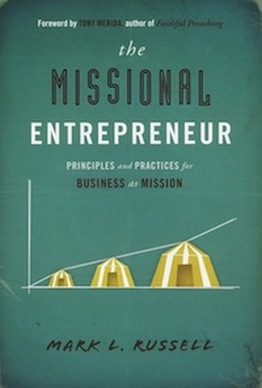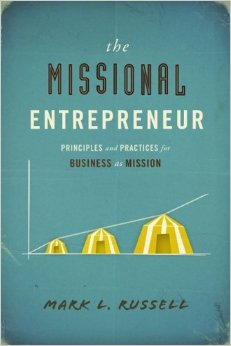|
Missional Enterprise: a Vehicle for Reconciliation “Throughout history, business has brought people together and pulled them apart. It has helped humankind progress while also revealing our darkest impulses.” It’s no secret that we live in a broken world … poverty, injustice, oppression, violence and corruption are all realities of the day and age we live in. Many businesses have been used as instruments of evil and exploitation, contributing to much of the brokenness in the world. However, “business can be an instrument in providing for humanity, an avenue to serve others, a place to exercise one’s gifts and skills, and a vehicle of reconciliation.” Which is why we need to understand God’s purpose for business and not let it remain in it’s broken state. In The Missional Entrepreneur, Russell presents four spheres of life that are broken and that God is on mission to reconcile:
Missional enterprise is an incredible opportunity to partner with God in bringing healing and renewal to each of these areas of brokenness. We easily understand how business can effect the economy in great ways and in more recent years, people are realizing the positive impact that businesses can have socially and environmentally; but the spiritual aspect of business bringing healing seems to be more allusive, yet crucial. The uniqueness of business is that it is an open door to everywhere and not just into physical places but also into the hearts of people. Everyday around the world people engage in business in a plethora of ways from the rich to the poor from the consumer to employee to owner. “Being missional is about living in a state of being that is at the center of God’s mission wherever you are … and the spiritual mission of business is not to establish a kingdom of wealth and power but to bring the Kingdom of God to tangible reality.” As businesses help build communities, provide for humanity, serve people according to their needs, and more; they become a physical expression of spiritual realities. This is what we strive for within the Global Enterprise Network; using the Triple Bottom Line to see Kingdom Values permeate all dimensions of enterprise unleashing the gospel. We do realize that God doesn’t need business and doesn’t need us to bring healing and reconciliation to the world but what a privilege that He invites us to join with Him to carry out His mission. What are some specific, small ways businesses can bring renewal and restoration to your corner of the world? And where do you see yourself called to join God in His mission of renewing the world? – GEN Desk Coordinator
0 Comments
We often praise individuals who are entirely themselves, pulling themselves up by their own bootstraps and achieving success. We are exhorted through scriptures like Psalms 139:14 to stand as individuals and focus on how God has created us. “ I praise you, for I am fearfully and wonderfully made.  It is true how God has uniquely crafted every person. But if we are imposing or separating ourselves from others through our "uniquely individual" perspective, how do we address "adapting" to engage the values and customs of the other cultures we are seeking to live and disciple among? In “The Missional Entrepreneur,” Mark Russell addresses a crucial topic regarding the necessity for missional entrepreneurs to understand and respect their new cultural context. In the past, many missionaries sent to the "lost " were Americans. As Americans, we have been raised in an “Individualistic, Universalistic, and Monochromatic” environment. In other words, Americans are taught and naturally bring to the mission field how to:
The cultural values Americans have been raised in are viewed differently in the cultures they are seeking to live and disciple among. For example, Asian and Latin American cultures often function as “Collective, Particularistic, and Polychromatic” socities. This challenges missional entrepreneurs to:
Understanding and abiding to these cultural adaptations is not denying your self or your heritage. “Contextualizing” is living out the calling to serve as a relational and personal witness, to give up our self, and to love others first in a new set of cultural values. Paul describes his journey as: "For though I am free from all, I have made myself a servant to all, that I might win more of them. To the Jews I became as a Jew, in order to win Jews. To those under the law I became as one under the law (though not being myself under the law) that I might win those under the law. To those outside the law I became as one outside the law (not being outside the law of God but under the law of Christ) that I might win those outside the law. To the weak I became weak, that I might win the weak. I have become all things to all people, that by all means I might save some. I do it all for the sake of the gospel, that I may share with them in its blessings. Every missional entrepreneur will face the challenge to remain comfortable and stagnant in their own cultural context. Yet, remaining unwilling to see the world through a different perspective, or understand the customs of different cultures, will weaken our ability to see the gospel of Jesus and his Kingdom advance through generations of laborers living and discipling among the lost. - GEN Desk Director Consider Foreign to Familiar by Sarah Lanier for further reading on cultures, adaptation, and contextualization.
 “We were called here to serve.” Many overseas missionaries and domestic missionaries have used this phrase to explain where and why they are serving in a specific region or vocation. As powerful as this phrase is, it can also be a hidden challenge for missional entrepreneurs to confront. Missional entrepreneurs face the hard test of serving as both business owners and missionaries. So what service comes first, their call to witness or their call to operate as business leaders? The question of these priorities is a tough, but necessary, topic to address. A fine balance exists in the BAM world as missional entrepreneurs. A business may fail because it is not given proper time and attention. On the other hand, personal relationships may suffer at the expense pursuing a prosperous business. So what is the answer? Missional entrepreneurs are blessed with the unique opportunity to influence fellow co-workers and employees. With the guidance of Christ, the workplace is the missions field. Intentionally focusing on business operations, and seeking to serve employees as an involved leader, allows the real Mission to manifest itself into the daily lives of the lost. A story in Mark L. Russell’s “The Missional Entrepreneur," is told about two small businesses that were both located in the same cultural context, supported by Christian missions, and run by faithful believers. One business excelled, the other failed. What was the difference between the two businesses? One owner became overwhelmed by the need to spread the gospel and run a full-time business, the other intertwined the gospel with daily business operations and devoted his missional efforts to reaching the lost and hurting who came to work at the company. Discovering the balance between serving in the missions field and running a business is not an easy path to traverse. Have faith in where your heart is being led, and rest in the peace that the One who sent you has gifted you specifically with the desire to meet the needs of His children through the capacity of business. (Romans 8:28) As you are called to serve as a missional entrepreneur, so His will and glory will be done. “And my God will supply every need of yours according to his riches in glory in Christ Jesus.” Philippians 4:19 - GEN Desk Intern |
Categories
All
Archives
March 2020
|

 RSS Feed
RSS Feed
